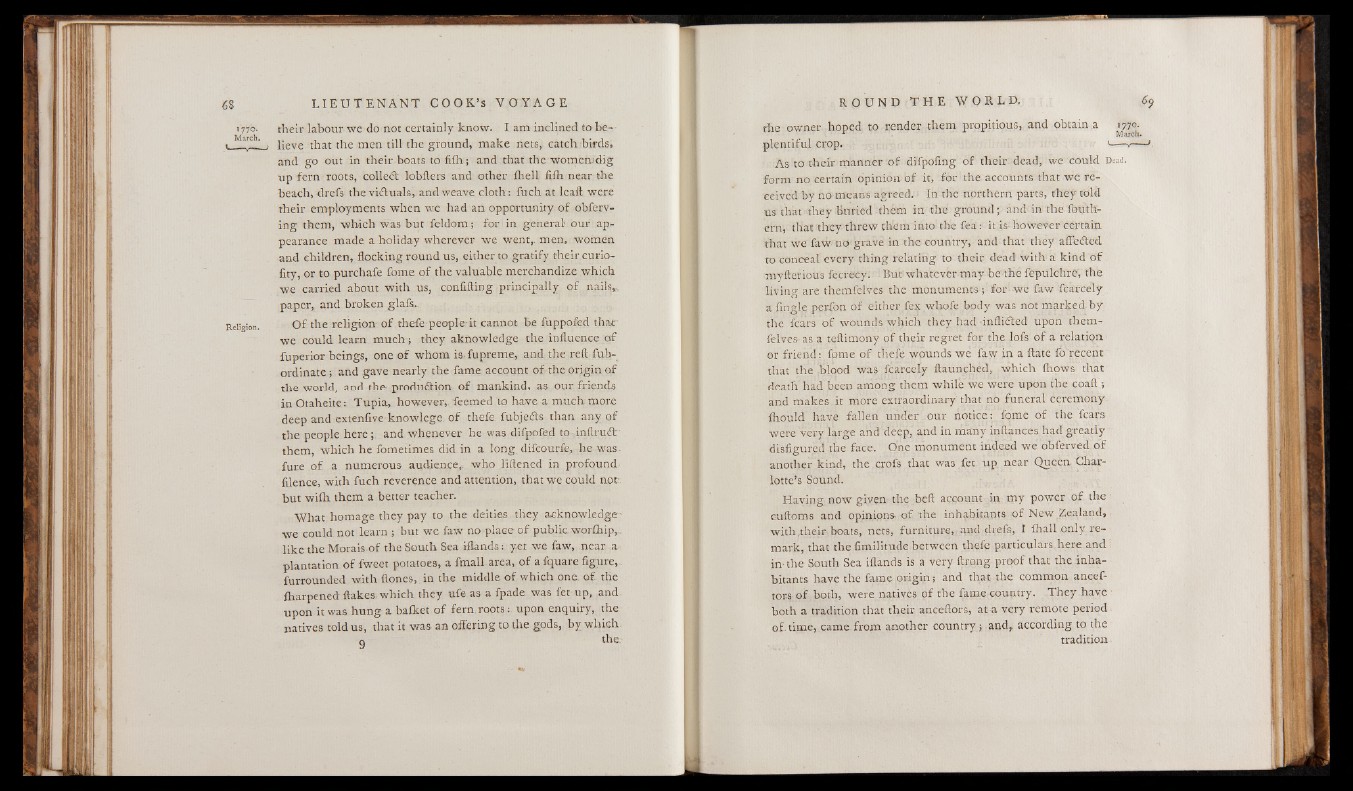
i77°' their labour we do not certainly know. I am inclined to be-
. " c ‘ ■ lieve that the men till the ground, make nets, catch birds,
and go out in their boats to fifh; and that the womemdig
up fern roots, collect lobfters and other fhelL fifh near the
beach, drefs the victuals, and weave cloth: fuch at leaf! were
their employments when we had an opportunity of obferv-
ing them, which was but feldom; for in general our appearance
made a holiday wherever we went,, men, women
and children, flocking round us, either to gratify their curio-
fity, or to purchafe fome of the valuable merchandize which
we carried about with us, confifting principally pf nails,,
paper, and broken glafs.
Religion. Of the religion- of thefe people it cannot be fuppofed that'
we could learn much; they aknowledge the influence of
fuperior beings, one of whom is. fupreme, and the reft fub-
ordinate ; and gave nearly the fame account of the origin o f
the world, and the production of mankind, as our friends
in Otaheite: Tupia, however,, feemed to have a: much more
deep and extenfiveknowlege of thefe fubjeCts-than any of
the people here;, and whenever he was difpofed to inftrudt-
them, which he fometimes did in a long, difcourfe, he was.
fure of a numerous audience,, who liftened in profound
filence, with fuch reverence and attention, that we could not:,
but wifhthem a better teacher.
What, homage they pay to the deities they acknowledge-
we could not learn ; but we faw no place of public worfhip,..
like the Morais of the South Sea iflands: yet we faw, near a
plantation of fweet potatoes, a fmall. area, of a fquare figure, .
furrounded with Hones, in the middle of which one. of. the
fharpened flakes, which they ufe as a fpade was fet up, and
upon it was hung a bafket of fern roots: upon enquiry, the
natives told us, that it was an offering to the gods, by which
9 the
rite owner hoped to render them propitious, 1 and obtain a M17a7rc0h..
plentiful crop. 1— .— '
As to their manner of difpofing of their- dead, we could Dead,
form no certain opinion bf it, for the accounts that we received
by no-means agreed. In the northern parts, they told
us that they buried them in the’ ground; and in the fbuth-
ern, that they threw them into the fea: it is-however certain
that we faw no grave in the country, and that they affected
to conceal every thing relating to their dead with a kind of
myfterious fecrecy. But whatever may be the fepulchre, the
living are themfelves the monuments-; for: #e faw fcarcely
a Angle perfon of either ,fex whofe body was not marked by
the fears of wounds which they had -inflidted upon themfelves
as a teftimony of their regret for the lofs of a relation
or friend: fpme of thefe wounds we faw in a ftate forecent
that the .blood was fearcely ftaunched, which Ihows that
death had. been among them while we were upon the coaft ,;
and makes it more extraordinary that no funeral ceremony
fhould have fallen under our notice: feme of the fears
were very large and deep,' and in many inftances had greatly-
disfigured the face. One monument indeed we obferved of
another kind, the crofs that was fet up. near Queen Charlotte’s
Sound.
Having- now given the beft account in my power of the ■
c-uftoms and opinions, of the inhabitants of New Zealand,
with ,their- boats, nets, furniture,, and drefs, I fhall only remark,
that the fimilitude between thefe particulars here and
in- the South Sea iflands is a very ftrong proof that the inhabitants
have the fame,origin ; and that the common ancef-
tor.s of both, were natives of the fame country. They have i
both a tradition that their anceftors, at a very remote period
of . time, came, from another country; and, according to the
tradition